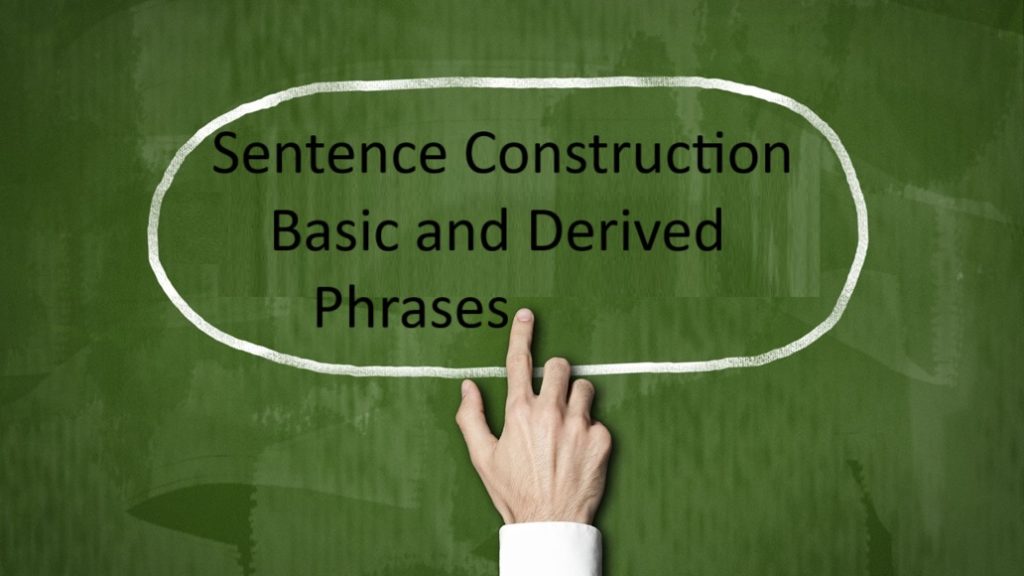The role of phrases whether they are basic or derived is highly significant in scholarly writing. Despite their significant role in writing, the learning writers do not try to acquire their in-depth knowledge and skill to use them productively. On account of this lack, their writing remains feeble. For vitalizing the writing of the novice writers, this post provides them with necessary information about the phrases. Further, it helps them know how they can use phrases in an accomplished manner. In this post, the focus has been given to the categorization of phrases and their role in sentence construction.
1. A Phrase
A phrase is composed of a single word or a group of words. Contrary to a clause, a phrase carries neither a subject nor verb and thus it stays as a part of speech. In other words, a phrase, plays the role of an element that fills some slot in a sentence or clause structure.
Some scholars are of the view that the phrases used in English sentence are of five types. These types include noun phrase, verb phrase, adjective phrase, adverb phrase and prepositional phrase. However, some other scholars say that there are eight types of phrases. These types are noun phrase, verb phrase, adjective phrase, adverb phrase, prepositional phrase, infinitive phrase, gerundive phrase, and participle phrase. On the basis of these views, phrases can be put into two categories, i.e. basic phrase categories and derived phrase categories. Examples of these categories are as follows:
1.1 Basic Phrase Categories
There are five basic phrase categories, i.e., noun phrase, verb phrase, adjective phrase, adverb phrase and prepositional phrase. In the following sections, all the phrase categories are detailed with examples.
1.1.1 Noun Phrase (NP)
A noun phrase may have different levels of its construction. It may be a noun or pronoun only (e.g., horse, verdict, we, something, etc.). It may contain determiners, attributive adjectives or noun modifiers before the head noun (e.g., an, the, our, four, many, etc.). There may also be noun phrases in which head nouns have post-modifying phrases or clauses (See 4. Noun Phrase Structure).
All these types of noun phrases have been exemplified in the following table.
Types of Noun Phrase
| Determiner + Noun | Adjective + Noun | Modifying Noun +Noun | Noun + Post-modifying Phrases or Clauses |
| the citizen | a little bird | a desert inhabitant | the technicians in the lab (N + P Phrase) |
| many books that I have read (N+ Relative clause) | |||
| many players | many local players | many hockey players | the plan finalized in the meeting (N + Participial phrase) |
1.1.2 Verb Phrase (VP)
A verb phrase may consist of a main verb with one of its inflectional forms: call, calls, called, calling, to call. There may be a number of auxiliary verbs along with the main verb form. The role of these auxiliaries is to add meanings related to the time of action: are calling, called, might call, will call. Further, more than one auxiliary verb may stay in a verb phrase, at times with not or some other adverbs as well. For example: is being called, have been called, have not been called, might not be called.
1.1.2.1 Finite Verb Phrase
A verb that is identifiable as either present or past is known as finite verb. When it stays along with its complements or supplements, it makes a finite verb phrase. In the finite verb phrases, are, is, have, has are present tense forms; and was, had, did, might are past tense forms. The significance of a finite verb phrase is that it is always the basic component of a sentence or main clause.
Example sentences/clauses with finite verb phrases
- The college principal has decided that class time should be reduced.
- The money will be paid the day after tomorrow.
- The interview committee concluded that the candidate was not eligible.
1.1.2.2 Non-finite Verb Phrase
A non-finite verb phrase either consists of, or start with, a participle (considering, considered) or an infinitive (to consider) form of the verb. The clauses with non-finite verb cannot stand alone as a sentence. They need a finite clause to be its complement or supplement.
Example sentences/clauses with non-finite verb phrases
- Considering whether to take action or not …
- Having considered the options, …
- … (not possible) to consider him for this post.
1.1.3 Adjective Phrase (AdjP)
A single word may stay as an adjective phrase: able, generous, respective, friendly, large, etc. In addition, in a phrase, an adjective may be preceded by an intensifying adverb such as very happy, completely ready, absolutely unacceptable, etc. Some adjectives may take a prepositional phrase, a that clause, or an infinitive clause after them. For example:
- pleased with the obedience
- happy that I shall be able to be with you
- ready to set out in the morning
1.1.4 Adverb Phrase (AdvP)
Usually an adverb phrase is composed of an adverb such as happily, entirely, soon, later, afterwards, etc. However, some adverbs may follow an intensifying adverb: extremely sorrowfully, quite happily, very attentively, etc.
1.1.5 Prepositional Phrase (PrepP)
When a preposition is followed by a noun, it becomes a prepositional phrase. For example: on the table, inside the door, before this evening, with a heavy load, in spite of bad health.
1.2 Derived Phrases
The infinitive, gerundive, and participial phrases are derived from verb. However, the function of these phrases is not that of a verb. Infinitive and gerundive phrases do the function of nouns in sentences. That is why they fill the slot of either subject or object in a sentence. The function of participial phrase is that of an adjective that is to modify a noun or pronoun.
1.2.1 An Infinitive Phrase
This phrase carries ‘to’ and the base form of a verb. In addition, modifiers or objects can also become the part of it (See 20. Verbals: Means of Enriched Expression of Concepts). For example:
- They intend to complete their journey before evening.
- To complete their task in a day was their aim.
- We took cold drinks to quench our thirst.
In example (a), the infinitive phrase is to complete their journey and its function is of direct object indicating what they intend. In (b), the infinitive phrase to complete their task in a day stays as subject of the sentence. In (c), the infinitive phrase stays as an adverb.
1.2.2 A Gerundive Phrase
This phrase comprises a gerund (verb +ing with a role of noun), modifier(s) or objects and essentially acts as a noun phrase (See 21. Role of Gerunds in Advanced Writing) . For example:
- I love eating dry fruit.
- Drawing human pictures is my favorite activity.
- My favorite activity is visiting hill stations.
In example (a), the gerundive phrase is ‘eating dry fruit’ and its role is that of object of the verb love. In (b), the gerundive phrase is ‘Drawing human pictures’ and it is doing the function of subject. In (c), gerundive phrase is a subject complement, i.e. it gives us complementary information about the subject.
1.2.3 A Participial Phrase
A participial phrase commonly comprises three parts: a participle, a modifier, and a noun or pronoun. The participle (though originally a verb) does the function of an adjective and thus it modifies the noun or pronoun. When a participial phrase is in the beginning, it needs be followed by a comma. Further, when this phrase is placed in the middle of a sentence, it should be set off by commas if it is not providing essential information. Furthermore, it can stay before or after the noun it describes. For example:
- Washing his face, Shareef sang a song.
- Kinza waved to the woman driving a car.
- Desiring to smoke cigarettes, the passengers rushed out of the bus when it stopped in a rest area.
In example (a), the participial phrase modifies “Shareef”; in (b), it modifies “man”; and in (c), it modifies “passengers”.
Participial phrases or clauses can also post-modify nouns. For example:
- The supervisor guided the boys swimming in the pond (N + Present Participle clause)
- I ate the bread baked my sister (N + Past Participle clause)
- They supported our decision to climb the mountain (N + infinitive clause)
Summary
Different scholars have given different number of phrase categories. According to some scholars, the number of phrase categories is five and others propound that the categories of phrases are eight. These categories are: noun phrase, verb phrase, adjective phrase, adverb phrase, preposition phrase, infinitive phrase, gerundive phrase, and participle phrase. In this post, these eight categories have been dealt with after placing them into two classes, i.e. basic phrases and derived phrases. Every category has been first defined with examples and then their role in sentence or clause structure has been mentioned. If the learning writers understand these categories of phrases and their role in sentence structure, they will feel comfortable in the production of their impactful texts.
Sources Consulted:
- Jackson, H. (2005)
- Prastowo, 2009 in Rahmanita, Sariyati Nurulaen (2019)
- Uswar and Lubis (2022)
- Win and Maw (2020)


